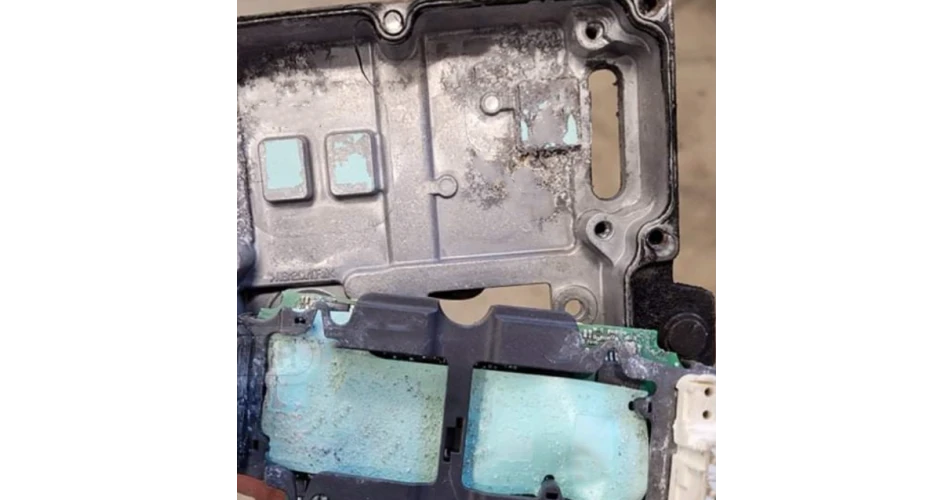Over the years, technicians have become familiar with basic resistance testing of components and circuits. But things are now changing, with the new energy revolution we are seeing, as more electric and hybrid vehicles are appearing in our workshops for diagnostic repairs.
Some recent cases have emphasized the importance of accurate testing processes and how we measure resistance and insulation.
Mitsubishi Outlander PHEV No Power Up A recent case of a Mitsubishi Outlander PHEV, with a rather unusual fault. The vehicle would not power up, and returned a fault code for Battery fault P0C78. On researching this code, it came back to pre-charge time being too long.
On these High voltage systems, the battery monitoring module will switch on 3 relays in turn: Positive contactor, precharge contactor, and the negative contactor last. This is done to monitor the current flow from the HV battery, testing for any possible issues with incorrect current flow or insulation problems. This is a safety feature of all HV systems.
To access these contactors, the HV battery was removed, and the contactors were tested individually. They passed the resistance measurements for the low voltage primary circuits, and the resistance across the contactors also proved to be very low. So we turned our attention to the high voltage components. And this is where the importance of insulation tests becomes apparent.
Each contactor is powered from the Battery Monitoring Unit (BMU) in turn. Positive, Pre Charge, and then Negative. During this time, current and voltage are monitored for any insulation faults. After powering down the high voltage system (Service Plug Disconnection), confirm a zero-voltage measurement before any tests are performed.
Use an insulation meter set to a level above the system operating voltage and test each HV line to chassis ground. Wait for a stable reading on the meter, in a perfect world that would be infinity, but a Megohm reading would normally be seen. PSA, for instance, require a minimum 2 Megohms insulation, but other manufacturers have their own specific requirements. Typically, you should get an insulation reading of 175 Kohms per volt. On this Outlander, operating at 320 volts, this would be 56 Megohms (175,000 times 320) of insulation.
When testing this Outlander HV system for insulation faults, we removed the front inverter from the circuit. On powering up the system, the fault remained. After reconnecting the front inverter and removing the rear inverter, the fault cleared. It was obvious the trouble codes were caused by the rear inverter.
We started insulation testing components on the rear inverter. The first item we tested was the Electrical Water Heater unit. This is used to boost the heating system in the passenger compartment. It failed the insulation testing. Insulation between the HV lines and chassis ground was only on the high KOhm range. After reconnecting the rear inverter, with the heater left disconnected, the system powered up normally.
But this is not the end of resistance measurements that have changed the way we test on modern vehicles. As voltage levels have increased, the importance of low resistance measurements is now paramount. To perform these measurements, a normal multimeter can not reach the desired accuracy needed.
We are now utilising a Milliohm meter to measure down to the required resolution. Even a small resistance of 0.1 ohms in a circuit with 100 amps, will have a volt drop of 10 volts. This is an unacceptable drop, and can generate unwanted, excess heat in the circuit. Additionally, resistance testing 3 Phase Motors/Generators requires a balanced ohm reading for all 3 phases. And at such low milliohms readings, around 20 milliohms on each phase, precision measurements are needed for a balanced smooth motor output.
Mercedes C-Class - HV System Fault A second case of high voltage insulation failure was recently reported on a Mercedes C-Class Hybrid. The fault message displayed on the instrument cluster was HV system unavailable. After a scan of all systems, a fault code P1426 was returned. On investigation these codes referred to High Voltage insulation failures.
A check with known case histories for this code on the C-Class hybrid revealed a known issue with the PTC Heater Module, similar to the Mitsubishi PHEV in the first example.
After powering down the HV system, and checking for a zero-voltage level, we removed the PTC heater module for investigation. We found exactly as the bulletin had reported, as a potential problem: a failed module, due to water ingress into the module. Not too surprising, as the module is located in the offside inner wing liner, and is subject to water ingress from the road spray. Not exactly the perfect location for any high voltage component to be located.
The workshop did not have access to insulation test equipment, so relied purely on Technical Service Bulletin (TSB) from the technical help line to trace the fault. This proved to be invaluable, with the lack of test equipment in this case.
Severe external corrosion was the first significant warning sign. On opening the component, it was evident that this was the issue of the insulation failure.
Subsequently, the workshop ordered their very own insulation meter, as this type of diagnosis will definitely be happening again.
To see or download this article click
here. There are lots more Tech Tips to view, and they are all searchable, on
TechTips.ie.
To join the Autobiz Helpline, call 01-905-9500, and then press 2, for further information.
 Water had entered into the PTC Heater Module on the Mercedes and had caused a fault
Water had entered into the PTC Heater Module on the Mercedes and had caused a fault
